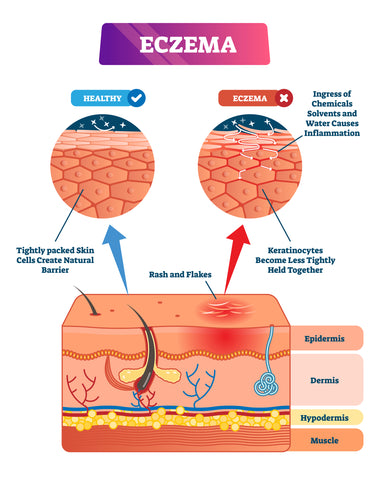on US orders over $100
on all US orders over $100
Eczema, or atopic dermatitis, is a group of medical conditions that cause inflamed, irritated skin. It affects around 35 million Americans every year, including 10 percent of women ages 20 to 45, and 10 to 20 percent of infants. The disease requires careful management to handle flare ups, including awareness of individual eczema triggers and finding the right treatment methods.

No matter which part of the skin is affected, eczema is almost always itchy. Sometimes itching will begin before any visible symptoms! Many people will develop a rash, most commonly on the face, back of the knees, wrists, hands, or feet.
Affected areas of the skin usually appear extremely dry, thick, or scaly. Depending on the tone of one's skin, the rash may initially begin to look red in color, but then turn brown. Or, if a person has a darker skin tone, eczema can affect pigmentation, making the affected area lighter or darker.
Particularly in infants and young children, the itchy rash can produce oozing, crusting patches.

The exact cause of eczema is unknown, but researchers believe that it is linked to an overactive response by the body's immune system. This autoimmune view of eczema is potentially supported by the disease commonly occurring in families with a history of allergy issues and asthma. Some doctors also say that defects in the skin barrier could force out moisture and trap germs in, causing irritation.
Sometimes flare-ups of eczema occur in response to certain conditions or exposure to certain substances. These can include:
For some patients, upper respiratory infections, colds, or stress may trigger the condition, or cause eczema to worsen.

Eczema has no cure, but can be successfully managed with medical treatment options and avoiding irritants. It's not contagious.
Treatment options can include:
Eczema outbreaks can be avoided or severely lessened by taking the following precautions:
Leave a comment